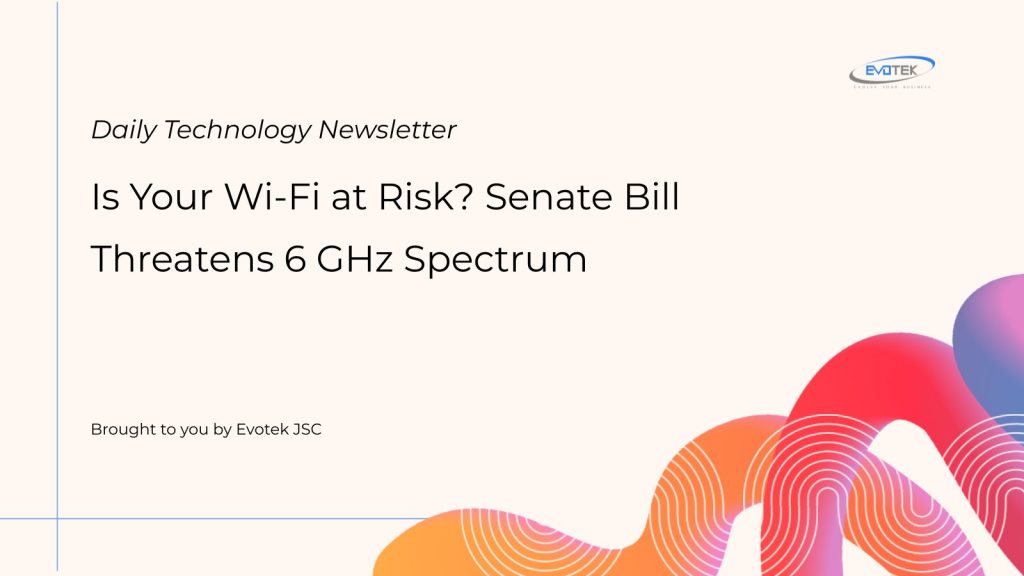A little-noticed provision in a Senate Republican budget bill could significantly impact the future of Wi-Fi, potentially slowing down speeds and limiting device connectivity. Senator Ted Cruz (R-Texas) is proposing a spectrum auction plan that could reallocate the 6 GHz band, currently used for Wi-Fi, to mobile carriers like AT&T, Verizon, and T-Mobile.
The 6 GHz Spectrum Showdown
The 6 GHz band is crucial for the advancement of Wi-Fi technology. It offers a larger spectrum band compared to the traditional 2.4 and 5 GHz bands, enabling faster speeds and supporting more devices. While the House of Representatives excluded the 6 GHz band (5.925-7.125 GHz) from planned spectrum auctions, Cruz’s bill removes this protection.
Instead, the Cruz bill proposes excluding the 7.4-8.4 GHz band, used by the military, from auctions. Experts warn that under the bill’s conditions, it could be challenging for the Commerce Department and FCC to meet the congressional mandate without taking spectrum away from Wi-Fi.
“The most vulnerable non-federal bands” such as 6 GHz and CBRS (Citizens Broadband Radio Service) are at risk for reallocation and auction, according to Michael Calabrese of New America’s Open Technology Institute.
Why 6 GHz Matters for the Future of Wi-Fi
The 6 GHz spectrum is vital for the widespread adoption of Wi-Fi 6E and the future Wi-Fi 7 standards. These technologies leverage the 6 GHz band to deliver near-doubled speeds, support hundreds of devices, prioritize lag-sensitive applications, and facilitate emerging technologies like virtual reality and telepresence.
Calabrese emphasizes that the bottleneck limiting home and business broadband capacity is shifting from the internet connection to the quality of Wi-Fi. The 6 GHz spectrum offers a solution by providing larger channels and supporting more devices.
Controversy and Concerns
This isn’t the first time the 6 GHz band has been at the center of a spectrum debate. In 2020, under FCC Chairman Ajit Pai, the band was allocated to Wi-Fi. CTIA-The Wireless Association, representing mobile carriers, argued that Wi-Fi didn’t need the entire band. Now, Pai leads the CTIA and is advocating for the reallocation of 6 GHz to mobile carriers.
Despite claims of a spectrum shortfall by CTIA, major telecom executives have stated otherwise. AT&T CFO Pascal Desroches said the company has “no pressing need” to acquire spectrum, while Verizon and T-Mobile executives have expressed similar sentiments.
Impact on Consumers and Businesses
Reducing Wi-Fi’s access to the 6 GHz spectrum could have significant implications for consumers and businesses alike. Calabrese warns that crowded venues like schools, airports, and shopping malls, where many people connect to the same access points, would be particularly affected.
Enterprise use of Internet of Things (IoT) technologies, such as Amazon’s use of indoor Wi-Fi to operate robots in fulfillment centers, could also be impacted.
What’s Next?
The Senate’s budget reconciliation bill is moving quickly toward a final vote, so the fate of the 6 GHz spectrum hangs in the balance. The outcome of this decision will have a profound impact on the future of Wi-Fi and the user experience for countless individuals and businesses.
Stay tuned for further updates as this story develops.

 日本語
日本語 한국어
한국어 Tiếng Việt
Tiếng Việt 简体中文
简体中文